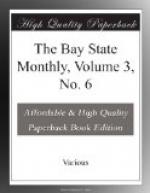The storming of the heights of Inkerman, the charge of the noble Six Hundred, the fearful onslaught of the Guards at Waterloo, the scaling of Lookout Mountain,—have all been sung in story, and perhaps always will be; but they all pale beside the glory that will ever enshroud the heroes who, with perhaps not literally “cannon to right of them” and “cannon to left of them,” but with a hundred cannon belching forth death in front of them, hurled themselves into the centre of a great army and had victory almost within their grasp.
To describe this charge, we will go back to the evening of the 2nd of July, and recall upon what basis the cautious Lee could undertake so fearful a responsibility. The victorious Southrons fresh from their triumphs at Fredericksburg and Chancellorsville had entered the North carrying consternation and dismay to every hamlet, with none to oppose; their forward march was one of spoil, and it was not till the 1st of July that they met their old foemen, the Army of the Potomac, in the streets of Gettysburg, and after a fierce conflict drove them back. The second day’s conflict was a terrible slaughter, and at its close the Federal Army, although holding its position, was to a certain extent disheartened. Many of our best generals and commanding officers were killed or wounded, scores of regiments and batteries were nearly wiped out, Sickles’ line was broken and driven in and its position was held by Longstreet. Little Round Top, the key of the position, was held only at a frightful loss of life, and Ewell upon the right had gained a footing upon the Ridge. The Rebel army was joyful and expectant of victory. The morning of the 3rd of July opened clear and bright, and one hundred thousand men faced each other awaiting the signal of conflict; but, except the pushing of Ewell from his position, the hours passed on relieved only by the rumbling of artillery carriages as they were massed by Lee upon Seminary Ridge, and by Meade upon Cemetery Ridge. At twelve o’clock Lee ascended the cupola of the Pennsylvania College, in quiet surveyed the Union lines, and decided to strike for Hancock’s Centre. Meanwhile, Pickett with his three Virginia brigades had arrived from Chambersburg and taken cover in the woods of Seminary Ridge. What Lee’s feelings must have been, as he looked at the hundred death-dealing cannon massed on Cemetery Hill, and the fifty thousand men waiting patiently in front and behind them, men whose valor he knew well in many a bitter struggle—and then looked at his handful of brave Virginians, three, small, decimated brigades which he was about to hurl into that vortex of death,—no one will ever know. The blunder that sent the Light Brigade to death at Balaklava was bad enough, but here were five thousand men waiting to seek victory where, only the day before ten thousand had lost their lives or their limbs in the same futile endeavor. Leaving the college, Lee called a council of his generals at Longstreet’s headquarters,




